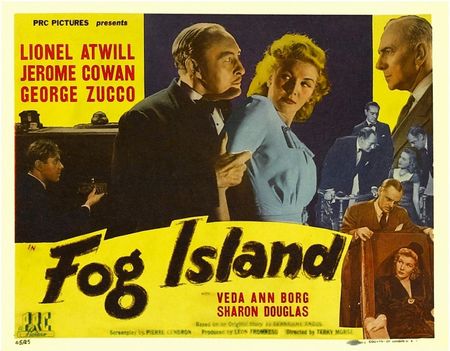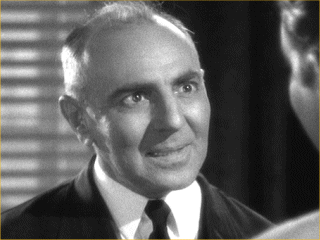IMDb meta-data: 1 hour and 12 minutes, 5.2 from 509 discerning cinemitizens.
After five years of porridge George Zucco is out for revenge! Shiver those timbers. While he was slammed up, someone went to Fog Island and killed Karma, George’s wife! That made for bad karma for him.

Since release he has holed up in a mansion with his step-daughter on Title Island to avoid a media feeding frenzy. To find the culprit(s) who framed him for embezzlement, he writes to them in a perfect Copperplate handwriting inviting them to visit him for a reunion. Who can resist Copperplate?
Otranto Island here they come! Meanwhile, George in a boiler suit does some home renovations for his forthcoming guests. He assumes their greed will bring them.
Greed? Here is where it gets foggy. George was innocent and framed by one or all of the invited associates, but each comes thinking to lay hands on the loot he allegedly but did not steal. See? ‘No,’ cried the fraternity brothers. ‘Did Georg Hegel write this,’ they asked? ‘Is it dialectic?’ Be that as it may, it gets no clearer.
In addition to the four associates, there is also a skulking butler, an accountant who rows to the island on his own to cooperate with George, and a beau for the step-daughter. The butler and the accountant know that George did not steal the dosh. See?
The four associates are: the turbaned head of a Psychic Research Centre, Lionel Atwill who is always a superb villain, Jerome Cowan who usually plays light, and Veda Ann Borg another treat. After the gang assembles for dinner, the men wearing tuxedos they packed for Otranto Island, George presents them each with a party favour, a key to one, a miniature skull to another, a baseball card, a pencil…. That got the fraternity brothers thinking, briefly.
This mansion, by the way, has all mod cons, a dudgeon, peep holes, secret passages, a moat, an oubliette, suits of armour, an organ, a sly butler as mentioned above, false doors, copies of ‘Crime and Punishment,’ dark corners, and a séance!
The guests do a lot of snooping around the place, and spying on each other. Among the ladies there is a very brief implication of lesbianism during a discussion of cleansing cream. The butler is the first to go and no one seems to notice.
About half way through, George’s contract ran out. Lionel is quick with a knife. Exit George. He fell at Lionel’s feet dead. Lionel, accustomed to such deaths from many previous films, does not bat an eye. Evidently he was the major culprit in the framing of George and the murder of Karma. If so, he should know there is no gelt to be had. So why is the dork there?
Though earlier Veda wanted to leave regardless of money, the script requires her to become mercenary, which she does with enthusiasm. Likewise the accountant, who knew George did not do it, joins the gang to find the ill gotten gains, which he knows do not exist. What a loser!
Somehow or other the party favours figure in the plot, but how, that is one of life’s mysteries. Veda seems the most normal, while Turban Woman’s fabricated pronouncements come true! Remember those home renovations. Even after his own death George has his revenge, leaving the daughter and beau to start afresh. The end.
This was one of Atwill’s last credits. Zucco, as always, dominates the camera.
 George Zucco
George Zucco
Cowan is better at light. The scripts is disjointed. Lionel asks the Psychic to perform a séance and as the others are seated, he walks away; unnoticed it seems, for some more snooping. Much of the film is so murky the sets could have been empty and probably were in this production from the Picture Releasing Corporation which was several strata below the bottom end of Poverty Row studios. In the gloom this viewer was often not sure who was whom and it was probably best that way.
As audiences saw this film news of the death toll on Iwo Jima would have begun to spread via seven thousand dreaded yellow ‘Regret to Inform you’ telegrams. Worse was to come at Okinawa.
Skip to content
